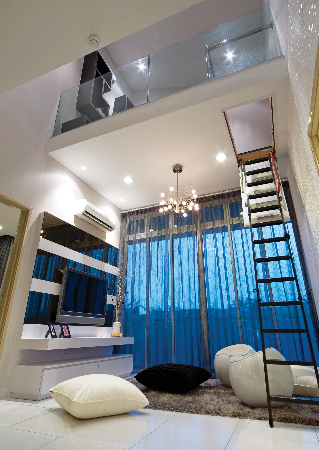We've looked at kitchen countertop materials to describe various materials and how they may be suited to different personalities – but until now, we have not attempted to apply that same perspective to decorative styles. While decorative styles are probably as varied as people, we have been seeing some similar personalities gravitating towards particular aesthetic styles – which we will attempt to describe here for the benefit of anyone who might be in the midst of finding themselves and their preferred decorative style.
There are innumerable methods for analysing personality, but perhaps the most stringently tested theoretical framework would be that of the Big Five personality traits (openness, conscientiousness, extraversion, agreeableness, and neuroticism) – which will be the theory we adopt here in order to generally associate a particular decorative style with a dominant personality trait.
Openness
One of the first Big Five personality traits to be discussed is usually an individual's "openness to experience" – which roughly translates to a person's imagination and bravery to venture into uncharted waters. A person who is considered high in "openness" is regarded as being receptive to variety – easily gravitating towards learning, art, or other creative pursuits; while a person low in "openness" will display a preference for routine and representational works of art such as classical sculptures rather than abstract or interpretive designs.
 It takes a certain kind of bravery to seek out and incorporate unconventional features — such as the pictured loft space, made accessible with the addition of an industrial attic (loft) ladder. Interior design by: Nice-Style Refurbishment
It takes a certain kind of bravery to seek out and incorporate unconventional features — such as the pictured loft space, made accessible with the addition of an industrial attic (loft) ladder. Interior design by: Nice-Style Refurbishment
Historically accurate decorative styles such as faithful classicism may not be ideal for highly open individuals, who tend to prefer more varied, esoteric, or eccentric blends of styles to reflect their unique tastes. An open person would seek to forge a unique décor wherever possible – perhaps even going as far as rearranging entire floor plans to achieve something different. On the flipside, a less open person may gravitate toward styles that are more commonly represented in today's homes – or even a style representing something from childhood – while adhering to the convention of the day as much as possible.
Conscientiousness
Describing how people react to expectations of society at large, a person high in conscientiousness is more likely to consider rules both written and unspoken – such as is required when attempting to pay tribute to classical aesthetics. A highly conscientious person considers the experience of guests and visitors more than their own comfort, and will likely seek out a familiar décor – such as a variation of modern contemporary or classical modern style – to achieve a comforting ambience for the benefit of others while aiming for the hallmarks of luxury.
 A conscientious homeowner seeks to enforce implicit aesthetic rules rather than break them. Designer: Design Integra
A conscientious homeowner seeks to enforce implicit aesthetic rules rather than break them. Designer: Design Integra
A less conscientious individual may be seen as unpredictable and impulsive – and the right decorative style in this case is more a matter of personal preference than anything else. A person low in conscientiousness will likely gravitate towards a unique décor to represent their singular personalities, rather than adhering to convention for the satisfaction of guests.
Extraversion
The dichotomy of extraversion and introversion is perhaps the most popular of facets in personality research – a person is considered extroverted when they display an innate attraction for social activity, while an introvert is one who values alone-time over a stint of hanging out.
 The home of an extravert will more than likely present bold shades favoured by exuberant personalities. Interior design by: Surface R
The home of an extravert will more than likely present bold shades favoured by exuberant personalities. Interior design by: Surface R
Extroverts plan their home around social events, considering factors like the placement of extra seating and opting for bold colours rather than relying on a neutral palette. Introverts, on the other hand, will prefer to design for personal comfort and use softer colours in the creation of solitary spaces such as the study or the bedroom.
Agreeableness
A person is considered agreeable when they display a high sensitivity for the feelings of others – and their decorative choices might closer reflect the norms of modern styling, while less agreeable individuals may be seen as being more concerned with their own avenues of self-expression.
 Individuals high in agreeableness will tend to prioritise the familiarity of the neutral palette and twentieth-century designs over self-expression. Interior design by: Alpex Design
Individuals high in agreeableness will tend to prioritise the familiarity of the neutral palette and twentieth-century designs over self-expression. Interior design by: Alpex Design
The most intriguing and awe-inspiring decorative styles are to be found in the homes of less agreeable individuals – while one can expect something more contemporary, less esoteric, and with greater mass-appeal in the home of an agreeable person.
Neuroticism
As a measure of emotional stability and how well a person copes with stress, the trait of neuroticism is not as well associated with any particular decorative style as any of the four previously described personality traits – but some conclusions can still be drawn. For instance, a highly neurotic person with a stressful career may have no use or appreciation for a study — the mere sight of a workstation may elicit feelings of frustration in the home.
 A carefree personality, low in neuroticism, lets stress roll right off and wouldn't be the least bit disturbed by clutter or asymmetry. Interior design by: Pins Studio
A carefree personality, low in neuroticism, lets stress roll right off and wouldn't be the least bit disturbed by clutter or asymmetry. Interior design by: Pins Studio
Neuroticism also informs how one deals with clutter in the home, a person who is more inclined to keep spaces clean, and is also less willing to cope with the stress of a mess, will likely be on the lookout for storage options – while the messier and less neurotic among us may not have even considered cleaning up at all.







Leave your comment